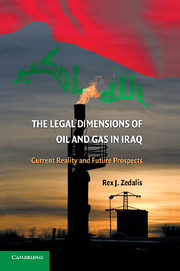Book contents
- Frontmatter
- Contents
- Foreword
- Acknowledgments
- Prologue
- PART ONE THE CONTEXTUAL BACKGROUND
- PART TWO THE COMPLICATIONS ASSOCIATED WITH IRAQI LEGISLATIVE MEASURES
- 3 Federal Oil and Gas Framework Law and Subcentral Government Responses
- 4 A Primer on the Federal Model Exploration and Production Contracts and the Kurdistan Regional Government's Model Production-Sharing Contract
- 5 The Federal Oil and Gas Revenue-Sharing Law: Its Many Problems
- 6 Measures to Reconstitute the Iraq National Oil Company (INOC) and Reorganize the Ministry of Oil
- PART THREE CURRENT ISSUES AND POTENTIAL FUTURE PROBLEMS
- Epilogue
- Index
6 - Measures to Reconstitute the Iraq National Oil Company (INOC) and Reorganize the Ministry of Oil
Published online by Cambridge University Press: 07 December 2009
- Frontmatter
- Contents
- Foreword
- Acknowledgments
- Prologue
- PART ONE THE CONTEXTUAL BACKGROUND
- PART TWO THE COMPLICATIONS ASSOCIATED WITH IRAQI LEGISLATIVE MEASURES
- 3 Federal Oil and Gas Framework Law and Subcentral Government Responses
- 4 A Primer on the Federal Model Exploration and Production Contracts and the Kurdistan Regional Government's Model Production-Sharing Contract
- 5 The Federal Oil and Gas Revenue-Sharing Law: Its Many Problems
- 6 Measures to Reconstitute the Iraq National Oil Company (INOC) and Reorganize the Ministry of Oil
- PART THREE CURRENT ISSUES AND POTENTIAL FUTURE PROBLEMS
- Epilogue
- Index
Summary
INTRODUCTION
No matter the nature of the oil and gas legal regime governing relations between the representatives of the international industry and the host Iraqi governmental authorities, there will always be concerns about the specific, individual governmental entities charged with overseeing or actively participating in petroleum operations. Thinking from the ground up, so to speak, there are at least three structural approaches to the nature and responsibilities of those entities. First, whether power and authority is concentrated in a single entity or shared by several, the idea might be to have only the host country's entity or entities undertake petroleum operations. Clearly, however, as has been shown, this is not the option selected by Iraq for its oil and gas sector. Second, although private, nongovernmental entities, whether domestic or foreign, may be allowed to participate in petroleum operations – as in fact is the case with respect to Iraq – they may have to do so in conjunction or competition with particular governmental entities. And third, despite the possibility of having an oil and gas legal regime that allows for specific, individual governmental entities to participate in the oil and gas sector, the same participant entity, or some other, may be charged with legal authority to formulate oil and gas development policy, particular rules and regulations with which all participants are expected to comply; supervise the conduct of petroleum operators to ensure observance of relevant rules and regulations; negotiate and structure contracts with nongovernmental participants; and engage in sundry other tasks related to or associated with oil and gas activities.
- Type
- Chapter
- Information
- The Legal Dimensions of Oil and Gas in IraqCurrent Reality and Future Prospects, pp. 171 - 208Publisher: Cambridge University PressPrint publication year: 2009



